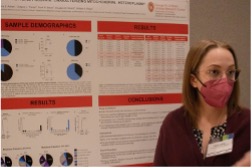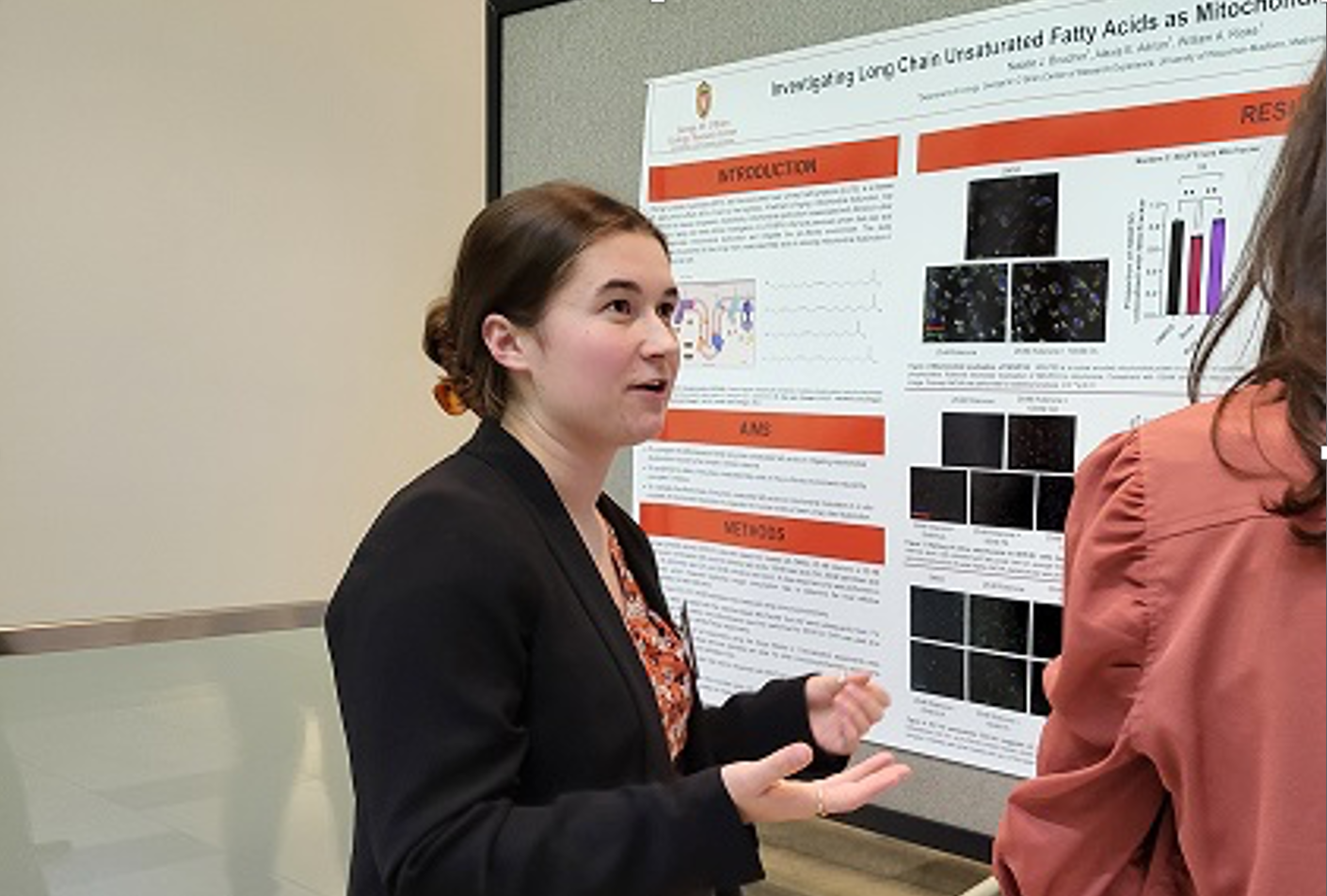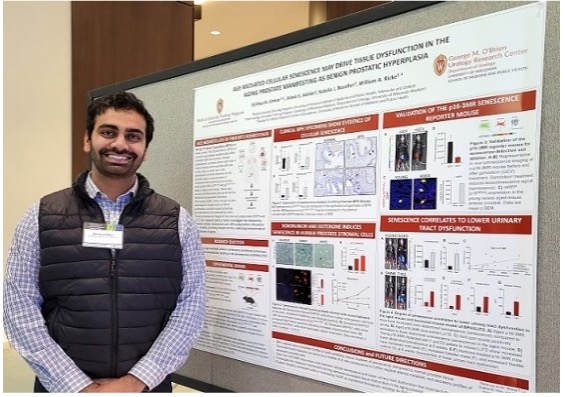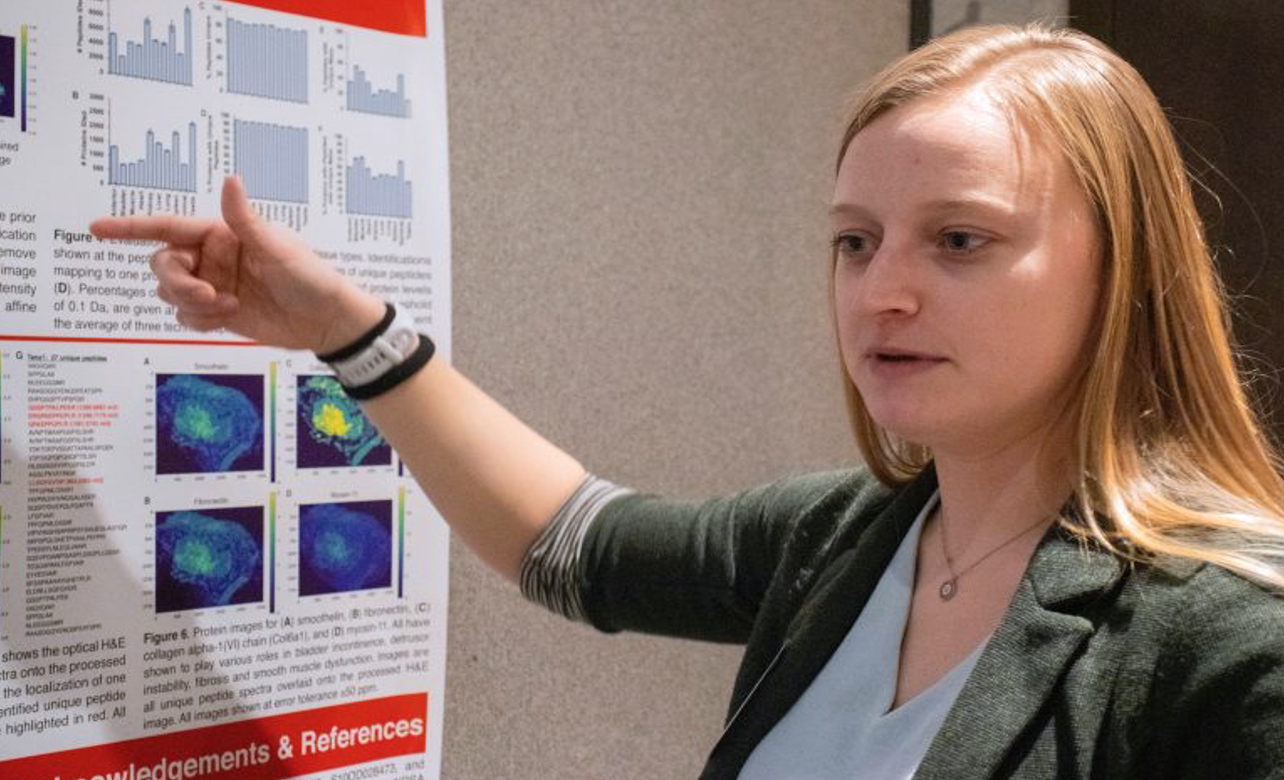Members of the Ricke Lab attended the Collaborating for the Advancement of Interdisciplinary Research in Benign Urology (CAIRIBU) Annual Meeting, held December 4-6 in Milwaukee, Wisconsin. Bringing together researchers from the CAIRIBU network, this national event enabled attendees to share their research findings on non-malignant genitourinary conditions, build collaborations, and advance knowledge in the field of benign urology research. Network members include leaders, trainees, and research teams of the NIDDK-funded U54 Urology O’Brien Centers, FORWARD P20 Centers for Interdisciplinary Research in Benign Urology, and Multidisciplinary K12 Urologic Research (KURe) and Urological Epidemiology (UroEpi) Institutional Research Career Development Programs.
Key highlights of the program involving Ricke Lab members include the following:
Alexis Adrian, PhD Candidate, has Top Scoring Abstract
 Congratulations to Alexis Adrian, PhD candidate, on her top-scoring abstract, Mitochondrial Dysfunction and the Aging Prostate: Characterizing Mitochondrial Heteroplasmy!
Congratulations to Alexis Adrian, PhD candidate, on her top-scoring abstract, Mitochondrial Dysfunction and the Aging Prostate: Characterizing Mitochondrial Heteroplasmy!
This project characterized mitochondrial heteroplasmy in young organ donor prostates and samples from patients with lower urinary tract symptoms attributed to benign prostatic hyperplasia (LUTS/BPH). These preliminary findings show a trending increase in the number of heteroplasmic mutations and the number of mutations that are predicted to be deleterious. Mutations frequently occurred at a biologically relevant threshold, and a greater proportion of mutations in the BPH samples encoded for complex I proteins. This work supports our hypothesis that mitochondrial dysfunction plays a role in LUTS/BPH pathology.
Natalie Boucher wins Best Prostate Poster
 Congratulations to undergraduate student Natalie Boucher on winning Best Prostate Poster for Investigating Long Chain Unsaturated Fatty Acis as Mitochondrial Modulators in the Prostate.
Congratulations to undergraduate student Natalie Boucher on winning Best Prostate Poster for Investigating Long Chain Unsaturated Fatty Acis as Mitochondrial Modulators in the Prostate.
Building off previous work in the lab showing mitochondrial dysfunction contributes to benign prostatic hyperplasia, this project looked to determine the effectiveness of long chain unsaturated fatty acids as mitochondrial modulators. Using a prostate stromal cell line model, oleic acid, palmitoleic acid, linoleic acid, and α-linolenic acid were investigated. Preliminary results show they all may have a potential protective role against rotenone-induced mitochondrial dysfunction and a pro-fibrotic environment.
Ajinkya Limkar presents Research, Take-Home Message
 Ajinkya Limkar, MD-PhD candidate, presented his project, Age-Mediated Cellular Senescence May Drive Tissue Dysfunction in the Aging Prostate Manifesting as Benign Hyperplasia and Lower Urinary Tract Dysfunction. Age-medicated cellular senescence plays a key role in Benign Prostatic Hyperplasia (BPH) and Lower Urinary Tract Dysfunction (LUTD) through the Senescence-Associated Secretory Phenotype (SASP), which promotes prostatic tissue dysfunction. In vitro models and aged p16-3MR senescence reporter mice demonstrated links between senescence, mitochondrial dysfunction, and LUTD severity. These findings highlight the potential of targeting senescence to improve BPH/LUTD management.
Ajinkya Limkar, MD-PhD candidate, presented his project, Age-Mediated Cellular Senescence May Drive Tissue Dysfunction in the Aging Prostate Manifesting as Benign Hyperplasia and Lower Urinary Tract Dysfunction. Age-medicated cellular senescence plays a key role in Benign Prostatic Hyperplasia (BPH) and Lower Urinary Tract Dysfunction (LUTD) through the Senescence-Associated Secretory Phenotype (SASP), which promotes prostatic tissue dysfunction. In vitro models and aged p16-3MR senescence reporter mice demonstrated links between senescence, mitochondrial dysfunction, and LUTD severity. These findings highlight the potential of targeting senescence to improve BPH/LUTD management.
Ajinkya also provided the Take-Home Message for Scientific Session 2, in which six presentations focused on how aging impacts the lower urinary tract, covering topics such as microbiome changes, cellular senescence, and the management of age-related conditions. Discussions included the role of the microbiome in urinary tract infections, regenerative approaches for treating vaginal atrophy, and gaps in care for overactive bladder. Additionally, Dr. Will Ricke’s presentation explored the role of cellular senescence in prostate aging and potential therapeutic targets for conditions like benign prostatic hyperplasia.
Overall, the session emphasized the need for early detection and innovative treatments for aging-related urinary tract disorders.
Hannah Miles presents research findings at CAIRIBU
 Hannah Miles, PhD candidate, presented Untargeted Spatial Mapping of Protein Biomarkers in a Model of Benign Prostatic Hyperplasia. This work focused on untargeted spatial mapping of peptides and proteins on-tissue using mass spectrometry-based techniques. The platform MSIght automates the integration of mass spectrometry imaging (MSI) with the high throughput, global profiling aspect of traditional LC-MS/MS. Such integration streamlines MSI and allows for application to large clinical cohorts of tissue microarrays.
Hannah Miles, PhD candidate, presented Untargeted Spatial Mapping of Protein Biomarkers in a Model of Benign Prostatic Hyperplasia. This work focused on untargeted spatial mapping of peptides and proteins on-tissue using mass spectrometry-based techniques. The platform MSIght automates the integration of mass spectrometry imaging (MSI) with the high throughput, global profiling aspect of traditional LC-MS/MS. Such integration streamlines MSI and allows for application to large clinical cohorts of tissue microarrays.